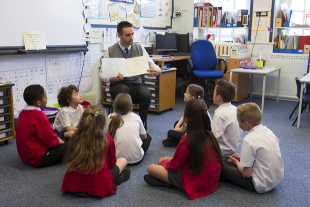
Today Ofsted published its annual report from 2019/2020. Below, we explore the report's key findings, and how the Department has supported the sector this year.
Key findings
Thanks to the efforts of staff in nurseries, schools, colleges and children’s homes, Ofsted’s annual report shows that the standard of education and care remains high across the board.
The report says:
Overall, these early findings are encouraging. In the vast majority of schools, early years providers and FES providers, curriculums are well developed, thought through and implemented.
Providers offering specialist curriculums can be more variable, sometimes either matching their offer well to the needs of learners or failing to have expert staff teaching well-considered plans.
Ofsted started inspecting under a new framework in September 2019. This new framework has brought a strengthened emphasis on the curriculum and so far has found that the overall effectiveness of the sector is high.
Ofsted found that 96% of early years settings are effective.
The report also vindicates the Government’s focus on early reading and particularly phonics by recognising the strength of evidence around children becoming proficient readers. The department has introduced a number of measures to improve early literacy including: the phonics screening check in 2012; the requirement to develop pupils’ phonics knowledge in the key stage 1 national curriculum; and the £43 million investment in primary English hubs to build a network of excellent phonics teaching in every region.
In schools judged as outstanding this year, pupils know more and remember more, and this is reflected in their attainment. The report shows there is a strong correlation between school inspection outcomes and students’ progress scores.
Importance of teachers and school staff
The report highlights the important role of teachers and school staff this year, many of whom have felt additional pressures during the pandemic.
Recognising the importance of supporting school staff with their mental health, the Department has published a range of resources, and case studies, to support remote education and help address staff workload.
We published a report by the Education Development Trust on school-led projects aimed at reducing teacher workload, with most looking at marking and feedback. The success in participating schools using the workload reduction toolkit is an encouraging example of where schools can identify and address their particular workload challenges and which can be adapted by others to suit their particular circumstances.
The Department has also published a range of resources, and case studies, to support remote education.
A Department for Education spokesperson said:
Thanks to the professionalism of staff in nurseries, schools, colleges and children’s homes, this report shows that the standard of education and support that children and young people receive has remained high.
It remains a national priority to keep full-time education open for all. We have allocated £1 billion to schools to supports all children to catch up on lost learning and are offering at least two years’ targeted tuition through the National Tutoring Programme to those who need it most.
Attainment gap and vulnerable children
While the attainment gap narrowed by 9% between 2011 and 2019, many children have had their education disrupted by coronavirus, and we cannot let them lose out. Schools are putting remote education in place for pupils who are self-isolating and our £1 billion Covid catch up package will tackle the impact of lost teaching time as a result of the pandemic, including a £650 million catch up premium to help schools support all pupils and the £350 million National Tutoring Programme for disadvantaged students.
Schools and Further Education providers have been working extremely hard to develop remote education contingency plans. This is testament to their commitment to ensuring any missed learning is recovered and that we prevent the attainment gap from widening further.
The Ofsted report found that under the social care common inspection framework (SCCIF), that the vast majority of children’s homes (80%) are currently good or outstanding. In the alternative provision (AP) sector, 85% of state-funded pupil referral units, AP free schools and AP academies were graded good or outstanding.
Reforms to the Special Educational Needs and Disabilities (SEND) system in 2014 introduced vital support for children, young people and their families. Our cross-government SEND review is looking at ways we can continue to ensure support is consistent, high quality, and integrated across education, health and care.
A Department for Education spokesperson said:
The safety and wellbeing of the most vulnerable children has always been a priority. That’s why we kept nurseries, schools and colleges open to those with Education, Health and Care Plans throughout the pandemic, where it was safe to do so, and provided clear guidance on who was eligible to attend.
We have supported local authorities, education providers and health services to respond to the challenges effectively, providing local authorities £3.7 billion to meet additional demands including within children’s services. We’re also increasing high needs funding for those with the most complex Special Educational Needs and Disabilities (SEND) by £780 million this year and a further £730 million next year, to help provide the support that parents rightly expect for their children.
Apprenticeships and Further Education
Further Education providers have been found to have thought more deeply and for longer about curriculum sequencing and content. These often lead to clearer choices for progression and employment.
The Ofsted report has also drawn attention to apprenticeships. The Secretary of State has been clear that boosting further education is at the heart of his vision for a world class education system, and we are investing significantly to level up skills and opportunity across the country. In addition to our £3 billion National Skills fund, we are making a total of £2.5bn of funding available in 2021-22, double that spent in 2010-11 in cash terms.
We are continuing to look at how the apprenticeship programme can best support the changing needs of businesses so more people can get ahead and all employers can benefit.